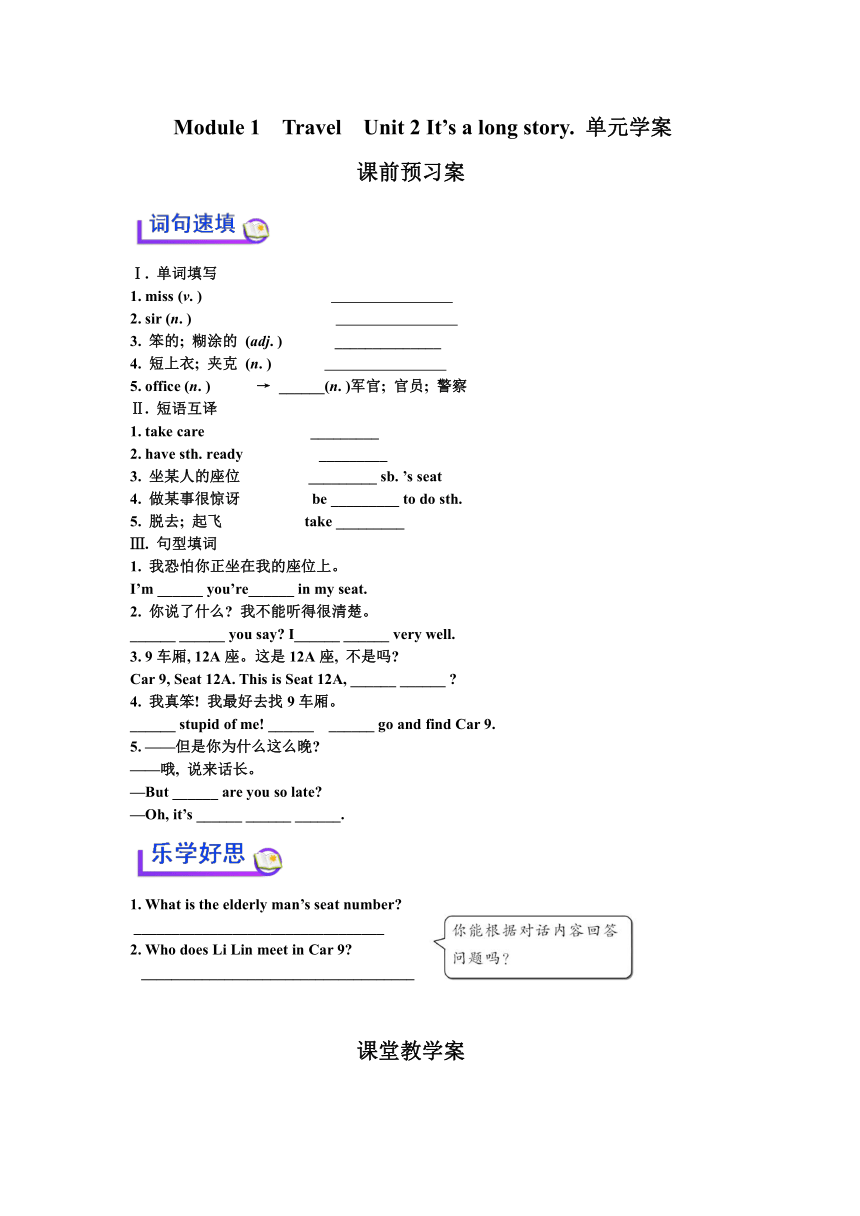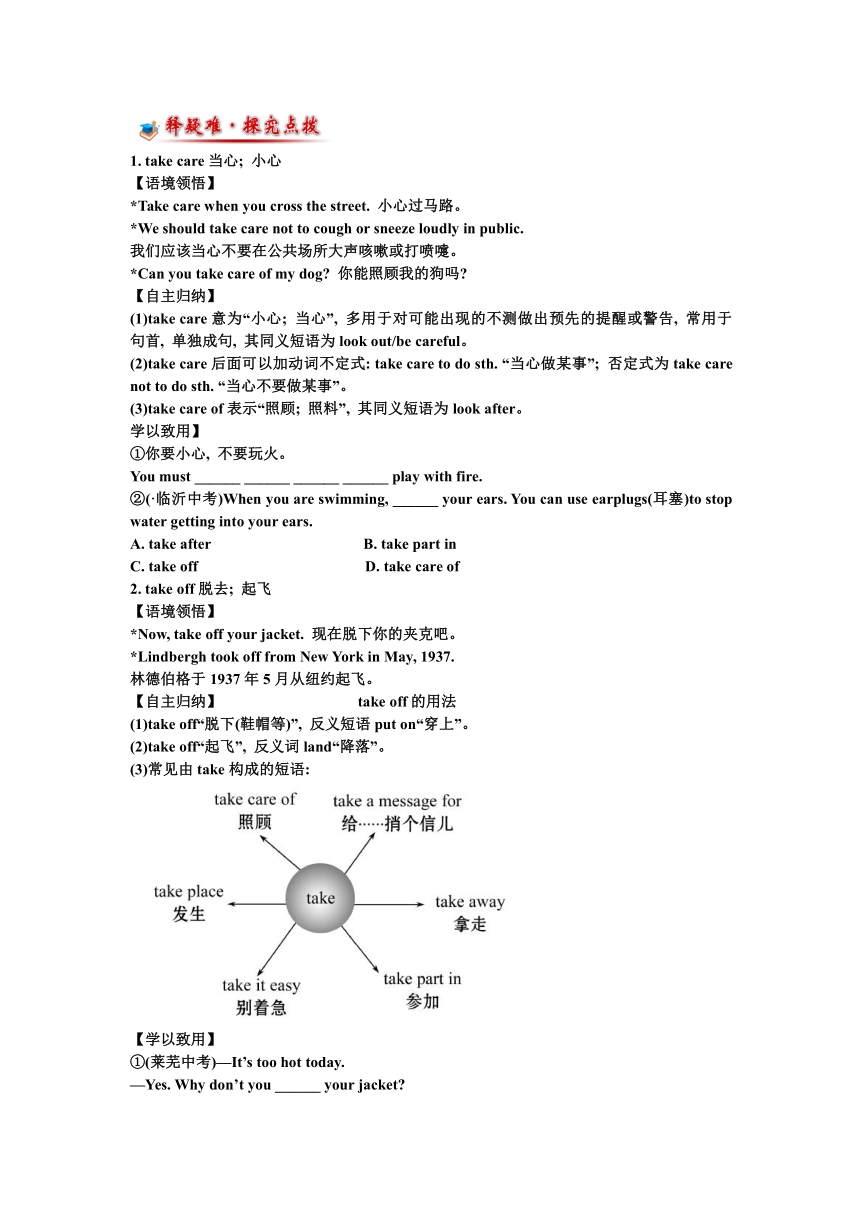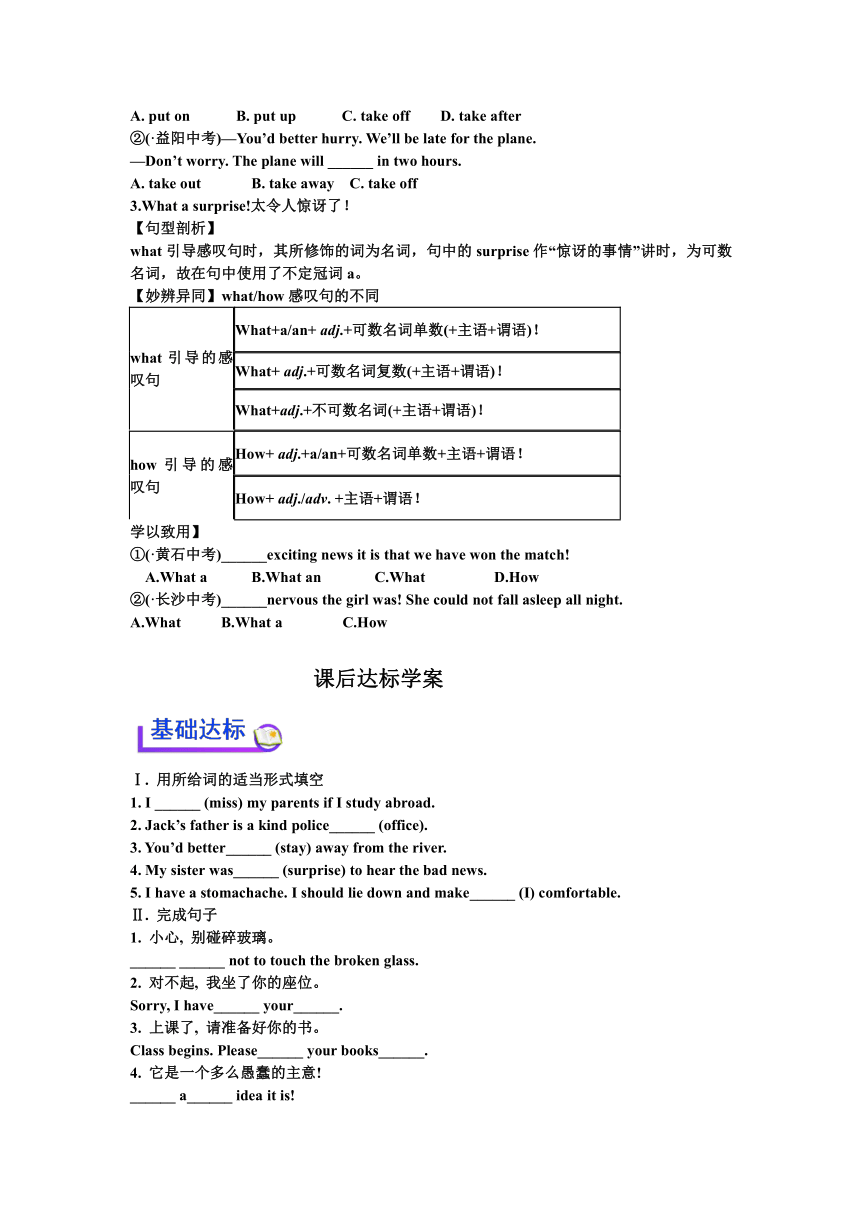Module 1 Travel Unit 2 It’s a long story. 单元学案
文档属性
| 名称 | Module 1 Travel Unit 2 It’s a long story. 单元学案 |

|
|
| 格式 | zip | ||
| 文件大小 | 552.3KB | ||
| 资源类型 | 教案 | ||
| 版本资源 | 外研版 | ||
| 科目 | 英语 | ||
| 更新时间 | 2015-07-15 12:47:21 | ||
图片预览



文档简介
Module 1 Travel Unit 2 It’s a long story. 单元学案
课前预习案
Ⅰ. 单词填写
1. miss (v. )
2. sir (n. )
3. 笨的; 糊涂的 (adj. ) ______________
4. 短上衣; 夹克 (n. )
5. office (n. ) → ______(n. )军官; 官员; 警察
Ⅱ. 短语互译
1. take care _________
2. have sth. ready _________
3. 坐某人的座位 _________ sb. ’s seat
4. 做某事很惊讶 be _________ to do sth.
5. 脱去; 起飞 take _________
Ⅲ. 句型填词
1. 我恐怕你正坐在我的座位上。
I’m ______ you’re______ in my seat.
2. 你说了什么 我不能听得很清楚。
______ ______ you say I______ ______ very well.
3. 9车厢, 12A座。这是12A座, 不是吗
Car 9, Seat 12A. This is Seat 12A, ______ ______
4. 我真笨! 我最好去找9车厢。
______ stupid of me! ______ ______ go and find Car 9.
5. ——但是你为什么这么晚
——哦, 说来话长。
—But ______ are you so late
—Oh, it’s ______ ______ ______.
1. What is the elderly man’s seat number
_________________________________
2. Who does Li Lin meet in Car 9
____________________________________
课堂教学案
1. take care当心; 小心
【语境领悟】
*Take care when you cross the street. 小心过马路。
*We should take care not to cough or sneeze loudly in public.
我们应该当心不要在公共场所大声咳嗽或打喷嚏。
*Can you take care of my dog 你能照顾我的狗吗
【自主归纳】
(1)take care意为“小心; 当心”, 多用于对可能出现的不测做出预先的提醒或警告, 常用于句首, 单独成句, 其同义短语为look out/be careful。
(2)take care后面可以加动词不定式: take care to do sth. “当心做某事”; 否定式为take care not to do sth. “当心不要做某事”。
(3)take care of表示“照顾; 照料”, 其同义短语为look after。
学以致用】
①你要小心, 不要玩火。
You must ______ ______ ______ ______ play with fire.
②(·临沂中考)When you are swimming, ______ your ears. You can use earplugs(耳塞)to stop water getting into your ears.
A. take after B. take part in
C. take off D. take care of
2. take off脱去; 起飞
【语境领悟】
*Now, take off your jacket. 现在脱下你的夹克吧。
*Lindbergh took off from New York in May, 1937.
林德伯格于1937年5月从纽约起飞。
【自主归纳】 take off的用法
(1)take off“脱下(鞋帽等)”, 反义短语put on“穿上”。
(2)take off“起飞”, 反义词land“降落”。
(3)常见由take构成的短语:
【学以致用】
①(莱芜中考)—It’s too hot today.
—Yes. Why don’t you ______ your jacket
A. put on B. put up C. take off D. take after
②(·益阳中考)—You’d better hurry. We’ll be late for the plane.
—Don’t worry. The plane will ______ in two hours.
A. take out B. take away C. take off
3.What a surprise!太令人惊讶了!
【句型剖析】
what引导感叹句时,其所修饰的词为名词,句中的surprise作“惊讶的事情”讲时,为可数名词,故在句中使用了不定冠词a。
【妙辨异同】what/how感叹句的不同
what引导的感叹句 What+a/an+ adj.+可数名词单数(+主语+谓语)!
What+ adj.+可数名词复数(+主语+谓语)!
What+adj.+不可数名词(+主语+谓语)!
how引导的感叹句 How+ adj.+a/an+可数名词单数+主语+谓语!
How+ adj./adv. +主语+谓语!
学以致用】
①(·黄石中考)______exciting news it is that we have won the match!
A.What a B.What an C.What D.How
②(·长沙中考)______nervous the girl was! She could not fall asleep all night.
A.What B.What a C.How
课后达标学案
Ⅰ. 用所给词的适当形式填空
1. I ______ (miss) my parents if I study abroad.
2. Jack’s father is a kind police______ (office).
3. You’d better______ (stay) away from the river.
4. My sister was______ (surprise) to hear the bad news.
5. I have a stomachache. I should lie down and make______ (I) comfortable.
Ⅱ. 完成句子
1. 小心, 别碰碎玻璃。
______ ______ not to touch the broken glass.
2. 对不起, 我坐了你的座位。
Sorry, I have______ your______.
3. 上课了, 请准备好你的书。
Class begins. Please______ your books______.
4. 它是一个多么愚蠢的主意!
______ a______ idea it is!
5. 他睡觉时没有脱衣服。
He didn’t______ ______ clothes while sleeping.
课后提升学案
Ⅰ. 根据句意及首字母或汉语提示完成单词(10分)
1. I lost my t , so I couldn’t get on the train. What should I do
2. They think Sam is a s boy but I think he is clever.
3. Good morning, (先生). Can I help you
4. The man in a blue (夹克)is my father.
5. Many people come to the Town Cinema because it has very (舒适的)seats.
Ⅱ. 用所给词的适当形式填空(10分)
1. My friend Dave isn’t an (office), but a common soldier.
2. A lot of people are at the airport, (say)goodbye to each other.
3. You’d better (get)up early to play sports every morning.
4. I am (surprise)to find that many children are playing beach volleyball in such hot weather.
5. It’s great (see)an old friend in a foreign country.
Ⅲ. 完成句子(10分)
1. 小心不要割着手指。
not to cut your finger.
2. 新学期到来前请准备好学习用品。
Please your school things before the new term comes.
3. 让我看一下你的驾照。
Let me your driving license.
4. 玛丽发现鞋子不合脚后, 立即脱掉了。
Mary found the shoes didn’t fit her and them quickly.
5. 运动员喝了些水, 让自己舒服些。
The player drank some water to .
Ⅳ. 补全对话(10分)
A: Good morning, Li Hong. The summer holiday will begin. Where are you going to spend your summer holiday
B: In Dalian.
A: In Dalian 1.
B: I’m going to take part in English Summer Camp.
A: 2.
B: By plane. It’ll take less time. And I have never taken a plane before.
A: Oh, I see. 3.
B: It is CA663.
A: 4.
B: At 9: 00 o’clock.
A: How soon will you get to Dalian
B: In about one and a half hours.
A: How fast the plane is! 5.
B: Thank you very much.
Ⅴ. 阅读理解(10分)
Tony Wheeler was born to travel. His father worked for an airline. For the first 16 years of his life, Wheeler and his family lived in many different countries.
In the early 1970s, Wheeler met a young woman named Maureen. They soon married. Before getting jobs, Tony and Maureen wanted to travel. They took a year-long trip from London, through Asia, to Australia. On the trip, they visited places like India, Iran, and Afghanistan.
When Tony and Maureen arrived in Australia, people asked many questions about their trip. To answer these questions, Wheeler wrote a guidebook called Across Asia on the Cheap. The book told people about different countries’ weather, customs(风俗), and places to see. But unlike travel guides in the 1970s, Wheeler’s book also talked about places most tourists did not go. He also wrote about unusual things to see and do. The book was very popular.
Wheeler and Maureen started a company called Lonely Planet. They continued travelling. They wrote guidebooks for each place they visited. Today, 400 people work for Lonely Planet. The company has over 650 guidebooks. Wheeler still writes about travel“hot spots”(for example, Cambodia in Asia and Croatia in Europe). For more information, read the books!
1. Which trip was Tony Wheeler’s first guidebook about
A. The United Kingdom.
B. From Asia to England.
C. From Australia to Afghanistan.
D. From England to Australia.
2. Why did Tony Wheeler write his first guidebook
A. He needed the money.
B. His wife asked him to do it.
C. Many people asked questions about his travels.
D. He liked writing books.
3. How was Across Asia on the Cheap different from other travel guides
A. It talked about places most tourists did not go.
B. It was longer and more expensive.
C. It told people about a country’s weather, customs, and places to see.
D. It was the first guidebook about Asia.
4. Which sentence below is true
A. Tony Wheeler still travels and writes guide books.
B. Tony Wheeler’s first guidebook was not popular.
C. After their first trip, Maureen did not travel with Tony.
D. Today, Lonely Planet is still a small company.
学案参考答案
课前预习案
答案: 1. 想念; 错过 2. 先生; 长官 3. stupid 4. jacket 5. officer
答案: 1. 当心; 小心 2. 把某物准备好 3. take 4. surprised 5. off
答案: 1. afraid; sitting 2. What did; can’t hear 3. isn’t it
4. How; I’d better 5 why; a long story
答案: 1. Car 9, Seat 12A. 2. Wen Peng.
课堂教学案
答案: ① take care not to ② D
答案: ①A ② C
答案: ①C ② C
课后达标学案
答案: 1. will miss 2. officer 3. stay 4. surprised 5. myself
答案: 1. Take care 2. taken; seat 3. have; ready
4. What; stupid 5. take off
课后提升学案
答案: 1. ticket 2. stupid 3. sir 4. jacket 5. comfortable
答案: 1. officer 2. saying 3. get 4. surprised 5. to see
答案: 1. Take care 2. have; ready 3. have a look at 4. took; off
5. make himself comfortable
答案: 1. What are you going to do there
2. How are you getting there
3. What’s your flight number
4. When will the plane take off/What time will the plane leave
5. I hope you will have a good time
答案: 1~4. DCAA
课前预习案
Ⅰ. 单词填写
1. miss (v. )
2. sir (n. )
3. 笨的; 糊涂的 (adj. ) ______________
4. 短上衣; 夹克 (n. )
5. office (n. ) → ______(n. )军官; 官员; 警察
Ⅱ. 短语互译
1. take care _________
2. have sth. ready _________
3. 坐某人的座位 _________ sb. ’s seat
4. 做某事很惊讶 be _________ to do sth.
5. 脱去; 起飞 take _________
Ⅲ. 句型填词
1. 我恐怕你正坐在我的座位上。
I’m ______ you’re______ in my seat.
2. 你说了什么 我不能听得很清楚。
______ ______ you say I______ ______ very well.
3. 9车厢, 12A座。这是12A座, 不是吗
Car 9, Seat 12A. This is Seat 12A, ______ ______
4. 我真笨! 我最好去找9车厢。
______ stupid of me! ______ ______ go and find Car 9.
5. ——但是你为什么这么晚
——哦, 说来话长。
—But ______ are you so late
—Oh, it’s ______ ______ ______.
1. What is the elderly man’s seat number
_________________________________
2. Who does Li Lin meet in Car 9
____________________________________
课堂教学案
1. take care当心; 小心
【语境领悟】
*Take care when you cross the street. 小心过马路。
*We should take care not to cough or sneeze loudly in public.
我们应该当心不要在公共场所大声咳嗽或打喷嚏。
*Can you take care of my dog 你能照顾我的狗吗
【自主归纳】
(1)take care意为“小心; 当心”, 多用于对可能出现的不测做出预先的提醒或警告, 常用于句首, 单独成句, 其同义短语为look out/be careful。
(2)take care后面可以加动词不定式: take care to do sth. “当心做某事”; 否定式为take care not to do sth. “当心不要做某事”。
(3)take care of表示“照顾; 照料”, 其同义短语为look after。
学以致用】
①你要小心, 不要玩火。
You must ______ ______ ______ ______ play with fire.
②(·临沂中考)When you are swimming, ______ your ears. You can use earplugs(耳塞)to stop water getting into your ears.
A. take after B. take part in
C. take off D. take care of
2. take off脱去; 起飞
【语境领悟】
*Now, take off your jacket. 现在脱下你的夹克吧。
*Lindbergh took off from New York in May, 1937.
林德伯格于1937年5月从纽约起飞。
【自主归纳】 take off的用法
(1)take off“脱下(鞋帽等)”, 反义短语put on“穿上”。
(2)take off“起飞”, 反义词land“降落”。
(3)常见由take构成的短语:
【学以致用】
①(莱芜中考)—It’s too hot today.
—Yes. Why don’t you ______ your jacket
A. put on B. put up C. take off D. take after
②(·益阳中考)—You’d better hurry. We’ll be late for the plane.
—Don’t worry. The plane will ______ in two hours.
A. take out B. take away C. take off
3.What a surprise!太令人惊讶了!
【句型剖析】
what引导感叹句时,其所修饰的词为名词,句中的surprise作“惊讶的事情”讲时,为可数名词,故在句中使用了不定冠词a。
【妙辨异同】what/how感叹句的不同
what引导的感叹句 What+a/an+ adj.+可数名词单数(+主语+谓语)!
What+ adj.+可数名词复数(+主语+谓语)!
What+adj.+不可数名词(+主语+谓语)!
how引导的感叹句 How+ adj.+a/an+可数名词单数+主语+谓语!
How+ adj./adv. +主语+谓语!
学以致用】
①(·黄石中考)______exciting news it is that we have won the match!
A.What a B.What an C.What D.How
②(·长沙中考)______nervous the girl was! She could not fall asleep all night.
A.What B.What a C.How
课后达标学案
Ⅰ. 用所给词的适当形式填空
1. I ______ (miss) my parents if I study abroad.
2. Jack’s father is a kind police______ (office).
3. You’d better______ (stay) away from the river.
4. My sister was______ (surprise) to hear the bad news.
5. I have a stomachache. I should lie down and make______ (I) comfortable.
Ⅱ. 完成句子
1. 小心, 别碰碎玻璃。
______ ______ not to touch the broken glass.
2. 对不起, 我坐了你的座位。
Sorry, I have______ your______.
3. 上课了, 请准备好你的书。
Class begins. Please______ your books______.
4. 它是一个多么愚蠢的主意!
______ a______ idea it is!
5. 他睡觉时没有脱衣服。
He didn’t______ ______ clothes while sleeping.
课后提升学案
Ⅰ. 根据句意及首字母或汉语提示完成单词(10分)
1. I lost my t , so I couldn’t get on the train. What should I do
2. They think Sam is a s boy but I think he is clever.
3. Good morning, (先生). Can I help you
4. The man in a blue (夹克)is my father.
5. Many people come to the Town Cinema because it has very (舒适的)seats.
Ⅱ. 用所给词的适当形式填空(10分)
1. My friend Dave isn’t an (office), but a common soldier.
2. A lot of people are at the airport, (say)goodbye to each other.
3. You’d better (get)up early to play sports every morning.
4. I am (surprise)to find that many children are playing beach volleyball in such hot weather.
5. It’s great (see)an old friend in a foreign country.
Ⅲ. 完成句子(10分)
1. 小心不要割着手指。
not to cut your finger.
2. 新学期到来前请准备好学习用品。
Please your school things before the new term comes.
3. 让我看一下你的驾照。
Let me your driving license.
4. 玛丽发现鞋子不合脚后, 立即脱掉了。
Mary found the shoes didn’t fit her and them quickly.
5. 运动员喝了些水, 让自己舒服些。
The player drank some water to .
Ⅳ. 补全对话(10分)
A: Good morning, Li Hong. The summer holiday will begin. Where are you going to spend your summer holiday
B: In Dalian.
A: In Dalian 1.
B: I’m going to take part in English Summer Camp.
A: 2.
B: By plane. It’ll take less time. And I have never taken a plane before.
A: Oh, I see. 3.
B: It is CA663.
A: 4.
B: At 9: 00 o’clock.
A: How soon will you get to Dalian
B: In about one and a half hours.
A: How fast the plane is! 5.
B: Thank you very much.
Ⅴ. 阅读理解(10分)
Tony Wheeler was born to travel. His father worked for an airline. For the first 16 years of his life, Wheeler and his family lived in many different countries.
In the early 1970s, Wheeler met a young woman named Maureen. They soon married. Before getting jobs, Tony and Maureen wanted to travel. They took a year-long trip from London, through Asia, to Australia. On the trip, they visited places like India, Iran, and Afghanistan.
When Tony and Maureen arrived in Australia, people asked many questions about their trip. To answer these questions, Wheeler wrote a guidebook called Across Asia on the Cheap. The book told people about different countries’ weather, customs(风俗), and places to see. But unlike travel guides in the 1970s, Wheeler’s book also talked about places most tourists did not go. He also wrote about unusual things to see and do. The book was very popular.
Wheeler and Maureen started a company called Lonely Planet. They continued travelling. They wrote guidebooks for each place they visited. Today, 400 people work for Lonely Planet. The company has over 650 guidebooks. Wheeler still writes about travel“hot spots”(for example, Cambodia in Asia and Croatia in Europe). For more information, read the books!
1. Which trip was Tony Wheeler’s first guidebook about
A. The United Kingdom.
B. From Asia to England.
C. From Australia to Afghanistan.
D. From England to Australia.
2. Why did Tony Wheeler write his first guidebook
A. He needed the money.
B. His wife asked him to do it.
C. Many people asked questions about his travels.
D. He liked writing books.
3. How was Across Asia on the Cheap different from other travel guides
A. It talked about places most tourists did not go.
B. It was longer and more expensive.
C. It told people about a country’s weather, customs, and places to see.
D. It was the first guidebook about Asia.
4. Which sentence below is true
A. Tony Wheeler still travels and writes guide books.
B. Tony Wheeler’s first guidebook was not popular.
C. After their first trip, Maureen did not travel with Tony.
D. Today, Lonely Planet is still a small company.
学案参考答案
课前预习案
答案: 1. 想念; 错过 2. 先生; 长官 3. stupid 4. jacket 5. officer
答案: 1. 当心; 小心 2. 把某物准备好 3. take 4. surprised 5. off
答案: 1. afraid; sitting 2. What did; can’t hear 3. isn’t it
4. How; I’d better 5 why; a long story
答案: 1. Car 9, Seat 12A. 2. Wen Peng.
课堂教学案
答案: ① take care not to ② D
答案: ①A ② C
答案: ①C ② C
课后达标学案
答案: 1. will miss 2. officer 3. stay 4. surprised 5. myself
答案: 1. Take care 2. taken; seat 3. have; ready
4. What; stupid 5. take off
课后提升学案
答案: 1. ticket 2. stupid 3. sir 4. jacket 5. comfortable
答案: 1. officer 2. saying 3. get 4. surprised 5. to see
答案: 1. Take care 2. have; ready 3. have a look at 4. took; off
5. make himself comfortable
答案: 1. What are you going to do there
2. How are you getting there
3. What’s your flight number
4. When will the plane take off/What time will the plane leave
5. I hope you will have a good time
答案: 1~4. DCAA
同课章节目录
- Module 1 Travel
- Unit 1 We toured the city by bus and by taxi
- Unit 2 It's a long story.
- Unit 3 Language in use
- Module 2 Education
- Unit 1 They don't sit in rows.
- Unit 2 What do I like best about school?
- Unit 3 Language in use
- Module 3 Life now and then
- Unit 1 They sometimes work harder.
- Unit 2 I think life is better today.
- Unit 3 Language in use.
- Module 4 Rules and suggestions
- Unit 1 You must be careful of falling stones.
- Unit 2 we must keep the camp clean.
- Unit 3 Language in use.
- Revison A
- Module 5 Look after yourself
- Unit 1 We'd better get you to hospital.
- Unit 2 Get off the sofa!
- Unit 3 Language in use.
- Module 6 Eating togethe
- Unit 1 When is the school-leavers' party?
- Unit 2 Knives and forks are used for most Western
- Unit 3 Language in use
- Module 7 English for you and me
- Unit 1 Have you ever been to an English corner?
- Unit 2 We all own English.
- Unit 3 Language in use
- Module 8 My future life
- Unit 1 Here's to our friendship and the future
- Unit 2 I know that you will be better at maths.
- Unit 3 Language in use
- Revison B
